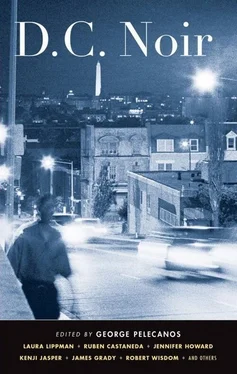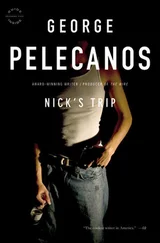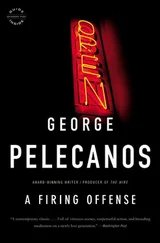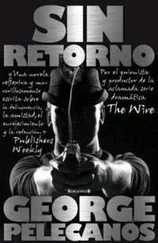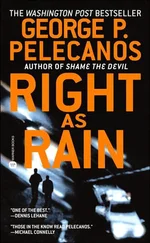Next to William and Ida’s on the other side was a group house for the mentally disturbed, muttering sad cases who boarded a van each weekday morning and were taken off to some useful occupation and brought back each night to Potomac Avenue. At home, if the weather was nice and even if it wasn’t, they drifted along the sidewalk like so much human litter. That’s not a very nice way of putting it. But whenever I saw Louis and Juanita and the other residents, whose names we didn’t know, they looked emptied out like the discards I picked up along the margins of the avenue. If they were sad, though, they didn’t know it. They used to try to bum cigarettes off us. They never could remember that we didn’t smoke.
The backyard of the group house was a wasteland where even grass was too depressed to grow. One scraggly tree managed to stay alive there and shelter, under its few remaining branches, a row of those cheap molded-plastic chairs you could pick up for a song at Kmart or Wal-mart. Early in the morning and late in the afternoon, the inmates of the group house would park themselves in those chairs like so many city birds — what my mother would call “trash birds,” grackles and starlings and the like — and smoke themselves closer to an early grave. I could have done without the smoke that sometimes carried across William and Ida’s backyard and into our kitchen windows.
The alley doglegged across the block, connecting the streets — 16th and Kentucky — that angled into Potomac on either end. Two lines of garage-style, brick-walled storage units faced each other across a narrow strip of concrete, sealed off from the alley by a chain-link fence that didn’t look like it would keep the rats out, must less any would-be burglars. That eyesore filled the lot right across from us, although it was interesting to speculate what might be hidden in those units. William said he’d seen a Rolls Royce in one of them, but that might just have been wishful thinking.
The day we found the doll, Dani was investigating a section of wall on the storage unit that bordered the alley. Three or four bricks had come out and created a gap. Right on the edge of it sat the doll, naked as the day it came off the Chinese assembly line. Other than that it looked right at home.
Over Dani’s strenuous objections I took it inside, put it in a place where she wouldn’t see it — who knew where that thing had been? — and forgot about it. I put a note in the alcove where we’d found it — We have your doll, come ring the bell at … — and then I forgot about that too. You forget a lot of things when you’re looking after a couple of kids.
Dani asked me if it belonged to William and Ida. I told her I didn’t think so. They had been there as long as I’d been alive, long enough for him to be called Mister William by most of the young people in the vicinity, while Ida stayed just plain Ida. They’d raised their kids and now they liked things quiet.
As for the young people, well, I didn’t much care for the teenagers who liked to hang out and yell at each other in the little park across the street, one of those orphan triangles of public space you find in D.C. where three or four streets come together at crazy angles. The teenagers scared me the first few nights we were in the house, but they weren’t real trouble. They just acted like they were. They liked to shout it up after hours when the rest of the neighborhood had locked itself behind doors for the night, but I never heard that they did anything but make noise. They weren’t part of the New Dragon posse. If you really wanted to freak them out, all you had to do was drive by slowly, roll down a window, and say hello in a big cheerful voice.
Weirdly enough, it was Juanita, not the teenagers, who freaked out. Like most of the group house inmates she looked older than she probably was — hair gone gray years before its time, half her teeth gone too, skin the color and texture of dried apricots. What really got to me was how she liked to wear latex gloves, the kind doctors put on for intimate exams. Lord knows where she got them, but they didn’t conjure up good associations.
One morning I came out and found one inside out on the sidewalk in front of our house. The fingers were still half-folded in on themselves, as though it had been pulled off in a hurry. Juanita stood about ten feet away watching me.
It was April, barely. March had come in colder than usual and stormed out again without leaving much in the way of spring behind it, and the first days of April struggled to catch up. I felt sorry for the flowers who’d pushed their way up expecting sunshine and mellow air and instead gotten the dismal leftovers of a winter that wouldn’t shake itself loose.
I was in a hurry that morning, trying to get my daughter in the car. Ida had stopped by to watch the baby for a few minutes; Dani was late for school already, and it wasn’t a day to linger out of doors. Juanita was out there having the first smoke of the day, bundled up and shapeless in the ratty down parka that had found its way to her through some dubious act of hand-me-down charity. I gave her a good morning that was as cheerful as I could make it under the circumstances.
“Man keys. Godababeedahl?” She cleared a wad of phlegm out of her throat — did she have to hawk it onto the sidewalk? — and looked at her shoes, Chuck Taylor All Stars a size too small and almost worn through at the toes. Without a full set of teeth she might as well have been speaking Chinese. On a good day I caught every third or fourth word. She was gesturing now; her arms windmilled furiously. “Fur man. Keys.”
“No cigs, Juanita.” I shrugged as I got Dani buckled into her car seat. I didn’t like her getting too close to any of the group house residents. I had no reason to think they were dangerous, but with people like that you might not know until it was too late. “We don’t smoke.” I nodded in Dani’s direction as if that explained everything Juanita needed to know.
Her hands dropped to her sides all of a sudden, as if her battery had run out. Then she groped in her pocket for something that turned out to be a piece of paper. It looked familiar. When she handed it to me I saw why. It was the note I’d left in the alley in case the lost doll’s owner came looking for it.
Juanita handed me my own note and wrapped her arms around herself, the gesture of someone cold or in need of comfort, and shook her head back and forth so hard it looked very likely she was doing her damaged brain more harm. “Babee. Doll. Man keys. Man keys!”
“We didn’t know it was your baby.”
“I’m a big girl!” Dani shouted from the backseat of our
“Not you, honey.” I hated myself a little every time I used the word “honey” with one of my children, especially when I was in the kind of mood I was in this morning. “She’s talking about her baby.”
“Baby DOLL.” The Ls of the last word hung in the cold air. Juanita gave me a big gummy smile that looked more anxious than happy. I saw now why she kept her arms wrapped around herself — she was shaking. “You get it back.” Her head bobbled forward and back, forward and back. “Keys. He need it.”
“All right,” I said. She was more nuts than I’d thought. I made a mental note to tell Dave to keep an extra-close eye on the kids when she was around. “Sure.”
“You get it, okay? Okay?” The arms were flailing again.
Dani made a noise that might have been a giggle and might have been something closer to fear. Kids always know when someone isn’t right.
“I’ll try.” I gave Dani’s car seat straps one more tug, even though I knew they were tight enough. She let out a howl of protest. “Sorry, honey. Mommy’s finished.” Juanita watched us pull away from the curb, her mouth forming the same words over and over.
Читать дальше
